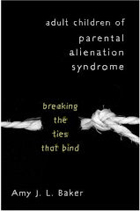Everyday Trauma: Induced Psychological Splitting in Children of Divorce and Separation
Credit: https://karenwoodall.blog
Understanding the impact of divorce and separation on children takes us down new pathways of understanding of induced psychological splitting, its manifestation in families and the every trauma it causes which has been hidden in plain sight for decades.

Ever since the early seventies, when divorce laws changed in the western world, the issue of a child’s alignment with one parent and rejection of the other has been a prominent but overlooked part of our understanding of trans-generational trauma.
It is my view, that just like the trans-generational trauma of domestic violence, (which is not about patriarchy but about inter-generational patterns of behaviour learned in the crucible of the traumatised dysfunctioning family), induced psychological splitting in children (aka parental alienation), has been wrongly characterised as only something one parent does to the other.
In my experience as a practitioner in this field, parental alienation is a spectrum problem in families which is manifested as a psychological defence in children and which is caused by a wide range of factors all of which can be traced back to trauma related reactions in one or more family members. The event of the divorce or separation may or may not be the trigger that causes or releases the trauma which is often present in the family via the background of one or more family members.
The task of the practitioner in this space is to discover, through careful assessment and differentiation, where the cause of the child’s induced psychological splitting comes from and then to reconfigure the power dynamics over the child to release them from having to use the psychological defence which is causing the alignment and rejection reaction.
This is an assessment and differentiation process which uses multiple assessment tools to understand how the child arrived at the point at which induced psychological splitting was the only route they could take to survive. Once the route into splitting has been identified, the rearrangement of the power and control dynamics (identifying who has the power and neutralising it), is the next step.
Which is why interventions with families affected by a child’s induced psychological splitting should always be undertaken in partnership with legal teams. Mental health professionals, whilst holding the tools to create the necessary psychological changes in the family, do not hold the power to compel parents to change their behaviours. Only when a Judge is holding the line and compelling change, can mental health practitioners confidently utilise the power devolved to them through this route. Only then can compulsion to change be held as a goal in treatment. Understanding how power and control dynamics work in a family affected by a child’s induced psychological splitting, leads to effective assessment, differentiation and management of such cases.
Parental alienation is a family dynamic which is infused with trauma. From the trans-generational transmission of trauma which comes to light in the divorce and separation landscape, to the trauma experienced by children using the defence of psychological splitting, to the trauma of the rejected parent (who in my experience suffers induced psychological splitting in response to the helplessness of their experience), this is everyday trauma which is hiding in plain sight.
 Illinois Divorce Lawyer Blog
Illinois Divorce Lawyer Blog

